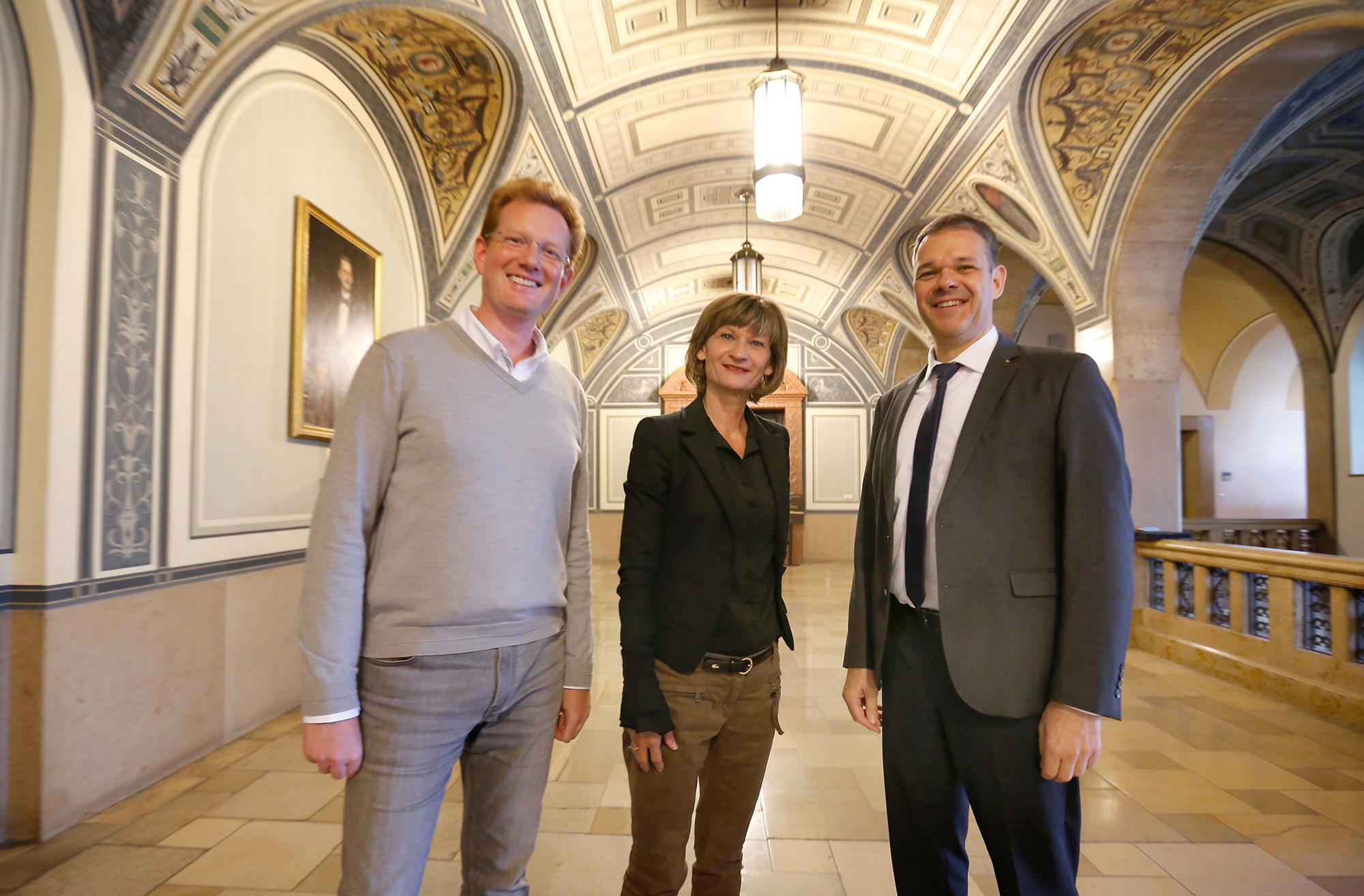The European Cultural Capital 2025 is Chemnitz: the City launches an ambitious idea
The city of Chemnitz could become European Cultural Capital 2025. The idea will be discussed and developed with residents of the city in the coming months to prepare a suitable bid. Lord Mayor Barbara Ludwig, Ferenc Csák, head of the City Culture Department and theatre director Dr Christoph Dittrich announced this idea yesterday in the Town Hall.
The idea for an application was developed with the heads of the parliamentary groups from the CDU/FDP, Linke, SPD, Bündnis 90/Grüne and Vosi/Piraten, as well as a number of stakeholders from the worlds of culture, business and science. Now the citizens of Chemnitz are invited to contribute their ideas and become part of the project. The Chemnitz city council will make a final decision on the bid.
“The dichotomous field between identity and change is a central European topic. I am convinced that Chemnitz can become a strong and fascinating Cultural Capital”, said Lord Mayor Barbara Ludwig. “And that’s why we have the courage and self-assurance to place the idea of becoming Cultural Capital on the agenda. In many ways, Chemnitz is a paradigm for modern Europe and its future.
In the past, our city has experienced painful fracture and deep-rooted change. But we have overcome these challenges. This shapes our mindset and turns Chemnitz into what it is today. We are not afraid of new things. On the contrary, we are, sometimes by necessity, a field of experimentation. And now more than ever it is a question of identity, affiliation and the management of change.
This is a fact that we have experienced many times, even literally, with the name of our city. Change is therefore part of Chemnitz’s DNA, more than any other German city. And so we look forward to being discovered and to offering surprises.”
An industrial metropolis, Chemnitz became a model socialist city after the ravages of the Second World War. The city was forced to rediscover its identity after German reunification. And in this process, economic and cultural progress always went hand-in-hand. Defining its identity remains a struggle for the city. One that involves how we perceive ourselves, whether and how we are perceived by others, how we want to be, and what around us is beautiful.
Chemnitz – Karl-Marx-Stadt – Chemnitz: the question of personal identity occupies people. Not just here, but in many other places as well. A city seeking to become Cultural Capital must offer more than just a series of events or classically handsome architecture:
Instead it is important to demonstrate what makes the city special and strong, and to use these aspects to develop a programme that promotes the European idea, strengthens civic cohesion and acts as a driver for widespread cultural and sustainable urban development. Cultural Capitals find answers to questions and problems that many European cities are currently asking themselves, and will continue to do in future. “Culture is far more than art. It includes sport, for example, physical culture, food, fashion, urban gardening, science, technology, pop culture and so much more”, says theatre director Dr Christoph Dittrich.
“Culture includes the rituals of our everyday existence that we pass on to our children. If we manage to locate experts in all these areas in our city and to work with them to prepare a bid, then we will obtain a wonderful cross-section of everything that defines us. And together we have a story to tell that visitors from throughout Europe will find enthralling.” Joining together to tell the story of our own city – this topic will also be reflected in the city anniversary year 2018.
It is therefore an entirely conscious decision that the preparation for the 875th anniversary of Chemnitz should become a chapter in this story. “We will only become Cultural Capital if we do it together”, says Ferenc Csák, who was already in charge of a successful bid as Cultural Capital by a Hungarian city in 2010. “Now is precisely the right time to launch this kind of project. What counts is to develop an idea that highlights what is special about our city as a part of Europe.
The programme in the Cultural Capital year should attract people from throughout Europe, make them curious to visit Chemnitz and at the same time breathe fresh life and inject a new quality into the combined forces of culture, education and urban development. It is imperative that the ideas have lasting effects. The shared bidding process and the legacy that remains beyond 2025 are at least as important as the events programme itself.”
Previous European Cultural Capitals have taken the opportunity to develop wasteland, unused infrastructure, to launch new cultural formats and collaborations, to attract more tourists and visitors to the city, to raise awareness, to rebrand and to create a more colourful and lively city.
Cultural Capital 2025 – how does the bid work?
The European Cultural Capital 2025 will be selected by the Council of the European Union in 2021 following a multistage bidding procedure – two cities in Europe carry the title each year. Germany and Slovenia will put forward the European Cultural Capitals in 2025.
The official bidding phase for the cities in Germany begins at the end of 2018, and the final decision will be announced in 2021. The European Union accompanies the entire selection procedure. In Germany, Weimar (1999) and Essen/Ruhr (2010) were the most recent »European Cultural Capitals«.



Get Social